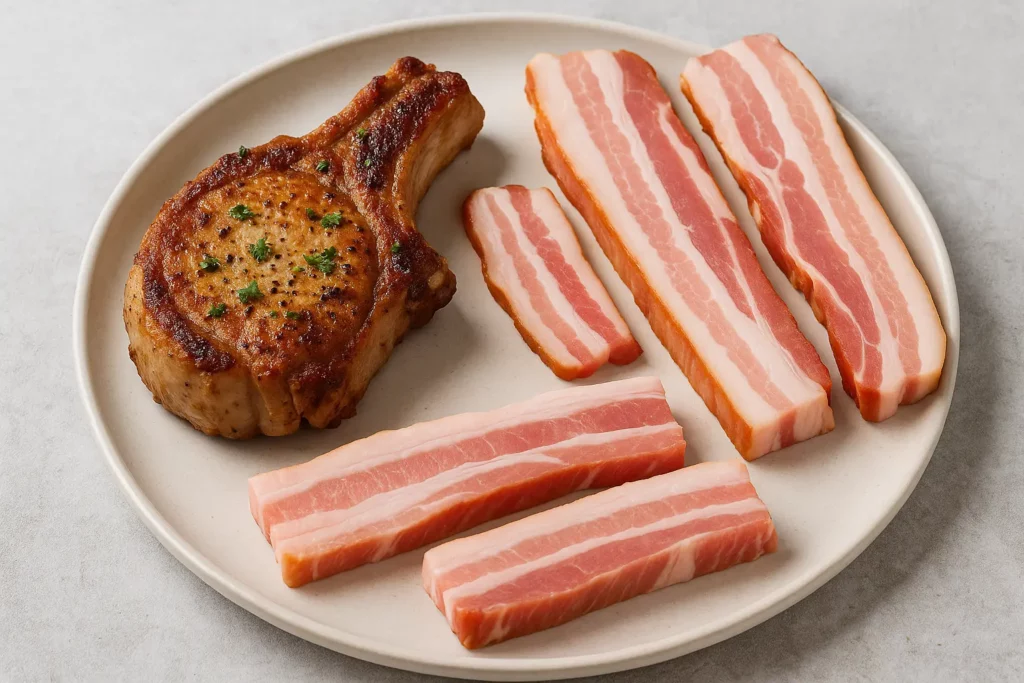This post may contain affiliate links. If you use these links to buy something we may earn a small commission. Thanks.
The carnivore diet has gained tremendous popularity in recent years as a radical yet simple way to eat. This all-meat, zero-carb lifestyle focuses exclusively on animal-based foods and completely eliminates plant-based products. For many, it’s a way to simplify eating habits, heal digestive issues, or fuel their body with nutrient-rich animal protein.
But one common question often arises: Can I eat pork on the carnivore diet?
Since pork is one of the most widely consumed meats worldwide, from juicy pork chops to savory bacon, it’s natural for people starting the carnivore diet to wonder if it fits within the plan. The answer is yes pork is absolutely allowed on the carnivore diet. However, there are a few considerations worth exploring, such as the nutritional profile of pork, the best cuts, how to cook it properly, and potential concerns about processed pork products.
In this article, we’ll break down everything you need to know about eating pork on the carnivore diet, including benefits, best practices, meal ideas, and common FAQs.
Understanding the Carnivore Diet
The carnivore diet is an extreme form of low-carb eating that emphasizes animal-based nutrition only. While keto and paleo diets allow plant-based foods like vegetables, fruits, nuts, and seeds, the carnivore diet cuts them out completely.

Basic principles include:
- Eating only animal products (meat, fish, poultry, eggs, animal fats, dairy if tolerated).
- Eliminating all plant-based foods (fruits, vegetables, grains, legumes, nuts, seeds).
- Using salt for seasoning, but otherwise avoiding herbs, spices, and sauces derived from plants.
- Relying on fat and protein for energy instead of carbohydrates.
The carnivore diet is often praised for its simplicity. With fewer food choices, people find it easier to stick to, and many report benefits such as improved mental clarity, reduced inflammation, digestive relief, and sustained energy levels.
Since pork is a meat product, it clearly aligns with the fundamentals of the carnivore diet—but let’s dive into the specifics.
Is Pork Allowed on the Carnivore Diet?
Yes—pork is completely allowed on the carnivore diet because it is 100% animal-based. Just like beef, chicken, or lamb, pork provides a high-quality source of protein, fat, and essential nutrients.
Many people enjoy pork for its flavor and variety. Compared to beef, pork is often slightly sweeter and more tender, making it a versatile addition to carnivore meals. Its affordability also makes it a practical choice for anyone following this diet long-term.
Pork can be prepared in numerous ways, from slow-roasted pork shoulders to pan-fried chops, or even crispy pork belly for those who love fattier cuts. Since carnivore eaters often seek higher fat intake for energy, pork’s range of fatty and lean cuts makes it adaptable for different preferences.
Nutritional Profile of Pork
Pork is a nutrient-dense meat with a balance of protein, fat, vitamins, and minerals. Let’s break it down:
Protein Content
- Pork is rich in complete protein, meaning it contains all nine essential amino acids.
- Protein supports muscle growth, tissue repair, and satiety making it crucial for the carnivore diet.
Fat Composition
- Pork contains a mix of saturated and monounsaturated fats.
- Fat provides energy for carnivore eaters, who don’t rely on carbohydrates.
- Cuts like pork belly and shoulder are higher in fat, while tenderloin and chops are leaner.
Vitamins & Minerals
Pork is particularly high in:
- Vitamin B12: Supports energy, red blood cell formation, and brain health.
- Thiamine (Vitamin B1): Important for energy metabolism; pork is one of the best sources.
- Zinc: Boosts immune system and cellular repair.
- Selenium: Acts as an antioxidant and supports thyroid function.
- Iron: Essential for oxygen transport in the blood.
Lean vs. Fatty Cuts
- Lean cuts like tenderloin are lower in calories but can be less satisfying.
- Fatty cuts like pork belly are ideal for energy on the carnivore diet.
- A balance of both helps keep meals varied and nutritionally complete.
Best Cuts of Pork for the Carnivore Diet
When it comes to pork, some cuts are better suited for carnivore eating than others. Here are the top options:
1. Pork Belly
- Extremely fatty, making it perfect for high-fat carnivore meals.
- Can be roasted, fried, or slow-cooked until crispy.
- Similar to bacon but often unprocessed.
2. Pork Shoulder (Boston Butt)
- Has a balanced fat-to-protein ratio.
- Great for slow cooking, roasting, or pulled pork.
- Budget-friendly and versatile.
3. Pork Chops & Tenderloin
- Leaner cuts, ideal for those who don’t need as much fat.
- Best when cooked with butter or lard to prevent dryness.
4. Bacon
- Popular on carnivore, but often contains preservatives and sugar.
- Best enjoyed in moderation and ideally sourced from minimally processed brands.
5. Organ Meats (Liver, Heart, Kidneys)
- Extremely nutrient-dense and recommended for variety.
- Rich in vitamins A, B, iron, and CoQ10.
Cooking Pork on a Carnivore Diet
Since the carnivore diet avoids plant-based seasonings, cooking pork relies heavily on animal fats and simple methods.
Simple Cooking Methods
- Grilling: Adds smoky flavor and crisp texture.
- Roasting: Works well for larger cuts like shoulder or belly.
- Pan-searing: Perfect for chops or tenderloin with butter or tallow.
- Slow-cooking: Ideal for making pork juicy and tender.
Carnivore-Friendly Flavoring
- Salt is the primary seasoning.
- Butter, ghee, lard, or tallow add moisture and flavor.
- Avoid plant-based marinades, sugary sauces, or vegetable oils.
Tips for Juicy Pork
- Don’t overcook lean cuts—use a meat thermometer.
- Rest pork after cooking to retain juices.
- Add extra fat (like butter) to leaner cuts.
Health Benefits of Eating Pork on Carnivore
Adding pork to your carnivore diet has several benefits:
- Muscle support: The protein content supports muscle growth and recovery.
- Nutrient diversity: Pork is especially high in thiamine, which beef lacks.
- Satiety and energy: Fatty cuts provide sustained energy for those relying on fat as fuel.
- Affordability: Pork is often cheaper than beef, making carnivore more sustainable.
- Variety: Eating only beef can become repetitive; pork offers new textures and flavors.
Potential Concerns and Considerations
While pork is suitable for the carnivore diet, there are a few considerations:
- Processed pork: Bacon, ham, and sausages often contain additives, nitrates, and sugar. Opt for minimally processed versions when possible.
- Fat quality: Some people prefer pork from pasture-raised pigs, as their fat profile tends to be healthier.
- Balance with other meats: Relying only on pork may create nutrient gaps. Mixing in beef, fish, and organ meats ensures broader nutrition.
Sample Meal Ideas with Pork on Carnivore
Here are some simple carnivore-friendly meals featuring pork:
- Breakfast: Crispy pork belly slices with fried eggs cooked in bacon fat.
- Lunch: Slow-roasted pork shoulder with crunchy skin.
- Dinner: Pan-seared pork chops with melted butter.
- Snack: Pork rinds or bacon strips for quick bites.
- Special treat: Pork liver pâté made with butter for a nutrient-dense dish.
FAQs
Q: Can I eat bacon every day on the carnivore diet?
Yes, but choose minimally processed bacon without sugar or additives. Balance with other cuts for variety.
Q: Is pork less healthy than beef?
Not necessarily. Pork has unique nutrients like thiamine, while beef is higher in iron. Both are valuable on carnivore.
Q: Do I need to eat only fatty pork cuts for energy?
Not always. Lean cuts can be paired with butter, tallow, or fatty sides to balance macronutrients.
Q: Can I include pork organs?
Absolutely. Pork liver, kidneys, and heart are excellent nutrient-rich additions.
Conclusion
So, can you eat pork on the carnivore diet? The answer is a resounding yes. Pork is an excellent addition to the carnivore lifestyle, offering a wide range of flavors, textures, and nutrients. From fatty pork belly to lean chops, and even organ meats, pork provides both variety and nourishment.
For best results, prioritize unprocessed cuts, cook them simply with animal fats, and pair them with other meats for balanced nutrition. Whether you’re looking for affordability, flavor, or nutrient diversity, pork has a well-deserved place on your carnivore plate.
Next time you fire up the grill, pan, or oven, remember: pork isn’t just allowed on carnivore it’s a tasty, versatile, and beneficial choice.
